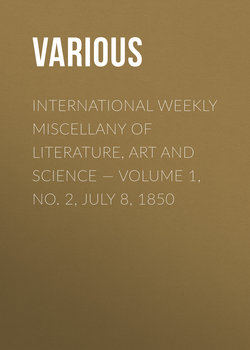Читать книгу International Weekly Miscellany of Literature, Art and Science — Volume 1, No. 2, July 8, 1850 - Various - Страница 4
TENNYSON'S NEW POEM. 1 THE MORMONS
ОглавлениеTHOMAS L. KANE, of Philadelphia, distinguished himself very honorably a year or two ago by the vindication of the Mormons against calumnies to which they had been subjected in the Western States, and by appeals for their relief from the sufferings induced by unlooked-for exposure in their exodus to California. We are indebted to him for an interesting discourse upon the subject, delivered before the Historical Society of Pennsylvania. He concludes this performance with the following observations, which we believe to be altogether just. Mr. KANE is a man of sagacity and integrity, and his opportunities for the formation of a wise opinion upon this subject were such as very few have possessed:
"I have gone over the work I assigned myself when I accepted your Committee's invitation, as fully as I could do without trespassing too largely upon your courteous patience. But I should do wrong to conclude my lecture without declaring in succinct and definite terms, the opinions I have formed and entertain of the Mormon people. The libels, of which they have been made the subject, make this a simple act of justice. Perhaps, too, my opinion, even with those who know me as you do, will better answer its end following after the narrative I have given.
"I have spoken to you of a people; whose industry had made them rich, and gathered around them all the comforts, and not a few of the luxuries of refined life; expelled by lawless force into the wilderness; seeking an untried home far away from the scenes which their previous life had endeared to them; moving onward, destitute, hunger-sickened, and sinking with disease; bearing along with them their wives and children, the aged, and the poor, and the decrepid; renewing daily on their march, the offices of devotion, the ties of family, and friendship, and charity; sharing necessities, and braving dangers together, cheerful in the midst of want and trial, and persevering until they triumphed. I have told, or tried to tell you, of men, who when menaced by famine, and in the midst of pestilence, with every energy taxed by the urgency of the hour, were building roads and bridges, laying out villages, and planting cornfields, for the stranger who might come after them, their kinsman only by a common humanity, and peradventure a common suffering,—of men, who have renewed their prosperity in the homes they have founded in the desert,—and who, in their new built city, walled round by mountains like a fortress, are extending pious hospitalities to the destitute emigrants from our frontier lines,—of men who, far removed from the restraints of law, obeyed it from choice, or found in the recesses of their religion, something not inconsistent with human laws, but far more controlling; and who are now soliciting from the government of the United States, not indemnity,—for the appeal would be hopeless, and they know it—not protection, for they now have no need of it,—but that identity of political institutions and that community of laws with the rest of us, which was confessedly their birthright when they were driven beyond our borders.
"I said I would give you the opinion I formed of the Mormons: you may deduce it for yourselves from these facts. But I will add that I have not yet heard the single charge against them as a community, against their habitual purity of life, their integrity of dealing, their toleration of religious differences in opinion, their regard for the laws, or their devotion to the constitutional government under which we live, that I do not from my own observation, or the testimony of others, know to be unfounded."
